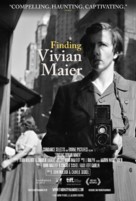Reviews provided by RottenTomatoes
Chris Nashawaty, Entertainment Weekly: More connect-the-dots detective thriller than traditional doc, John Maloof and Charlie Siskel's revelatory riddle of a film unmasks a brilliant photographer who hid in plain sight for decades Read more
Farran Smith Nehme, New York Post: The movie's true power comes from her images, by turns melancholy, sympathetic, funny and sharp. Read more
Moira MacDonald, Seattle Times: Maier's work, interspersed throughout the film, lets us hear her voice: an array of faces gazing at us, meeting her camera, creating a tiny moment in time. Read more
Bill Goodykoontz, Arizona Republic: Through dogged research and interviews with the (now-grown) children Maier cared for, along with their parents (including Phil Donahue), a profile emerges, and it's fascinating. Read more
Mark Feeney, Boston Globe: This is an amazing tale, and Maloof has labored mightily to flesh it out. He's almost as odd as Maier was. Read more
J. R. Jones, Chicago Reader: The portrait Maloof and Siskel assemble here from the scant information available suggests that her fanatical privacy was the darkroom in which her distinctive artistic personality was developed. Read more
Michael Phillips, Chicago Tribune: The movie does nearly everything right in its chosen, compact, 83-minute form. Read more
Peter Rainer, Christian Science Monitor: Maier is a great artist who discounted adulation entirely. Her life was a masquerade; her genius, quite literally, was unexposed. Read more
Tom Long, Detroit News: Every time one of her photos flashes on the screen, the woman's genius is undeniable. Read more
Boyd van Hoeij, Hollywood Reporter: A sleekly assembled and intriguing project, if clearly a very commercial proposition. Read more
Kenneth Turan, Los Angeles Times: What we find out about Maier, revealed in self-portraits as a striking woman with a singular sense of self, is fascinating. Read more
John Anderson, Newsday: Directors John Maloof and Charlie Siskel do a lot with what they have -- but they also had a lot to work with. Read more
Anthony Lane, New Yorker: An unlikely tale, well told. Read more
Ella Taylor, NPR: Self-taught and roaming free in the city, Vivian Maier captured the remarkable in the ordinary. Read more
Manohla Dargis, New York Times: An exciting electric current of discovery runs through "Finding Vivian Maier," a documentary about a street photographer who never exhibited her work. Read more
Steven Rea, Philadelphia Inquirer: Finding Vivian Maier is a find in more ways than one. Read more
Walter V. Addiego, San Francisco Chronicle: The film functions best as an introduction to her work, which is what matters, and an invitation to see more of it, which is highly recommended. Read more
Colin Covert, Minneapolis Star Tribune: This may be the most pleasurable 83 minutes you will spend in a theater this year. Read more
Joe Williams, St. Louis Post-Dispatch: The holes in the story are papered over with such beautiful photographs that few viewers could complain. Read more
Adam Nayman, Globe and Mail: A self-styled outsider artist comes into focus in Finding Vivian Maier, a striking documentary undertaken after one of its directors bought a nondescript box of photo negatives at a garage sale. Read more
Linda Barnard, Toronto Star: Most revealing are the interviews with the now-grown kids who were in Maier's care, who accompanied her as she made trips from their suburban homes to often-dodgy areas of Chicago so she could take photos. Read more
Keith Uhlich, Time Out: Maloof (a very aggravating onscreen presence) tries way too hard to force Maier's genius down our throat: His outrage at the snootily dismissive art-world establishment, however genuine, comes off like a childish tantrum. Read more
Ernest Hardy, Village Voice: Haunting and powerful despite its boilerplate documentary form ... Read more
Jerry Saltz, New York Magazine/Vulture: Maloof and co-director Charlie Siskel peel back her layers, allowing us to see where her creative universe came from, how she functioned, what she made. Read more
Ann Hornaday, Washington Post: A film that leaves a large part of its subject's mystery gratifyingly intact. Read more

